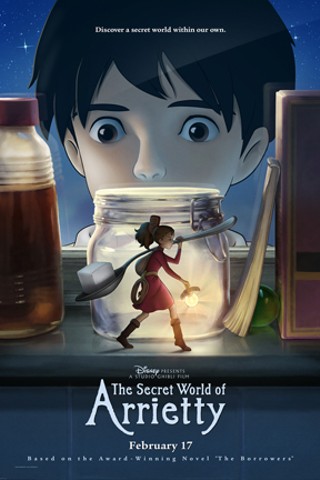Even though they have been distributed in the United States by Disney for several years, the films of Hayao Miyazaki are manifestly different from everything else that takes up residence in the House of Mouse. The animation style will catch your eye first, but beneath the surface, Miyazaki's films have an awareness to which Disney pictures—and all other mainstream animation, for that matter—simply do not aspire.
The relationship with Disney began with Spirited Away, which won the Best Animated Feature Oscar in 2003. Disney has released several Miyazaki films on DVD in the years since through an agreement with his animation factory, Studio Ghibli, while Ponyo and Howl's Moving Castle are among the films that have been released here theatrically.
Now in his 70s, the great Miyazaki is slowing down his notorious oversight of every aspect of his productions. As a matter of fact, he didn't even direct The Secret World of Arrietty, though he is credited with "screenplay and planning," so we can gather he was still intimately involved: Even though this is the directorial debut of Hiromasa Yonebayashi, the master's fingerprints are almost everywhere.
If there is a break from the tradition, it's a small thematic one. Miyazaki tends to lean toward feminism, pacifism and environmentalism. While they aren't absent in Arrietty, environmentalism and pacifism, at least, are embedded more in the subtext. The film is based on the classic Mary Norton children's novel, The Borrowers, which has been adapted a few times—on TV in the '70s with Eddie Albert, with John Goodman in 1997, and a couple of times on the BBC. It takes on new life here, with a charming script and that trademark manga animation.
The borrowers are tiny people who live behind the walls or in the floorboards of homes. To survive, they "borrow" things the humans won't miss, like a lump of sugar or a tissue. But humans don't like the intrusion, so when we meet Arrietty (Bridgit Mendler), she and her family fear that they're among the very last of their kind. To avoid being seen, the borrowers move by night. Arrietty's father, Pod (Will Arnett), scavenges for the family while her mother, Homily (Amy Poehler), stays at home and worries aloud. Now 14, Arrietty is about to embark on her first borrow.
The house above has just received a new guest, a teenage boy named Shawn (David Henrie), who has traveled to the longtime family home to rest before undergoing heart surgery. While he pre-convalesces, Shawn is under the watchful eye of Haru (Carol Burnett), who has always heard stories about the tiny people in the floor, and goes to great lengths to find them.
Borrowers are not supposed to be seen, so when Shawn spots Arrietty on her very first night on the job, it sets in motion a lot of tumult for her family. Will they have to move to a new house? Since they're smaller than Star Wars action figures, how long would it take to find any home, much less a suitable one? Can they get out before they're actually captured? None of it is presented very dramatically, though; much of the film's brief comedy comes from Homily overreacting to every little thing. You still have a sense that even though this film has more of an air of mystery to it than most cartoons, everything will work out for the best.
It's great to see (or hear) Carol Burnett working, but whether it's something that was literally lost in the translation of the script, or just poor direction given to the actors, it's clear that Burnett, Poehler and Arnett aren't in their comfort zones at all times. Poehler falls the flattest, most likely because her character is so extreme. The same can't be said for Mendler, whose Arrietty is a bit of a spitfire and seems less like a rigid cartoon character bound by plot developments X and Y.
The Borrowers of Mary Norton may be a fairly simple story, but The Secret World of Arrietty does gently weave in that environmentalism, pacifism and feminism for which Miyazaki is known. Here, again, a strong, heroic female lead is in the spotlight, and the film is mildly preachy about how the borrowers and the humans peacefully work out differences, making a fool of Haru whenever possible for angling otherwise. At first, however, it is harder to spot the environmental message. It feels very much like a plea on behalf of endangered species, especially those in the path of consumerism and consumption. Without a flashing neon sign that says, "Let all animals live in peace," that appears to be the ax on the grindstone. And it's deftly handled.
Even without an underlying message, The Secret World of Arrietty is a lovely piece of animation that reinforces the legacy of Hayao Miyazaki—not that his legacy needs any help.











